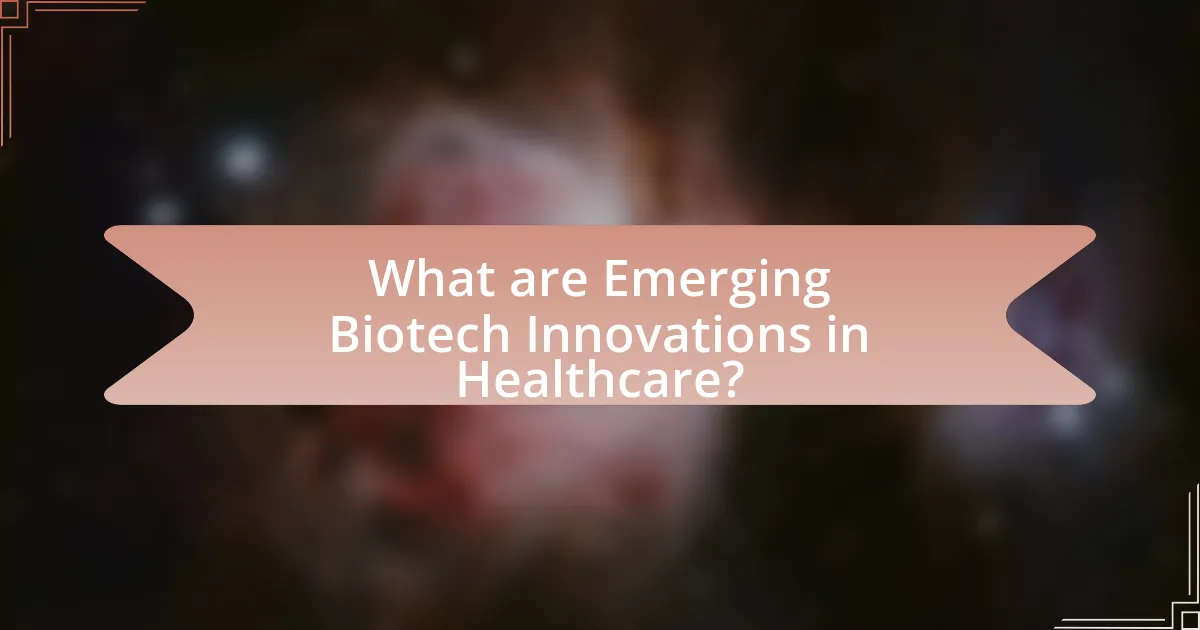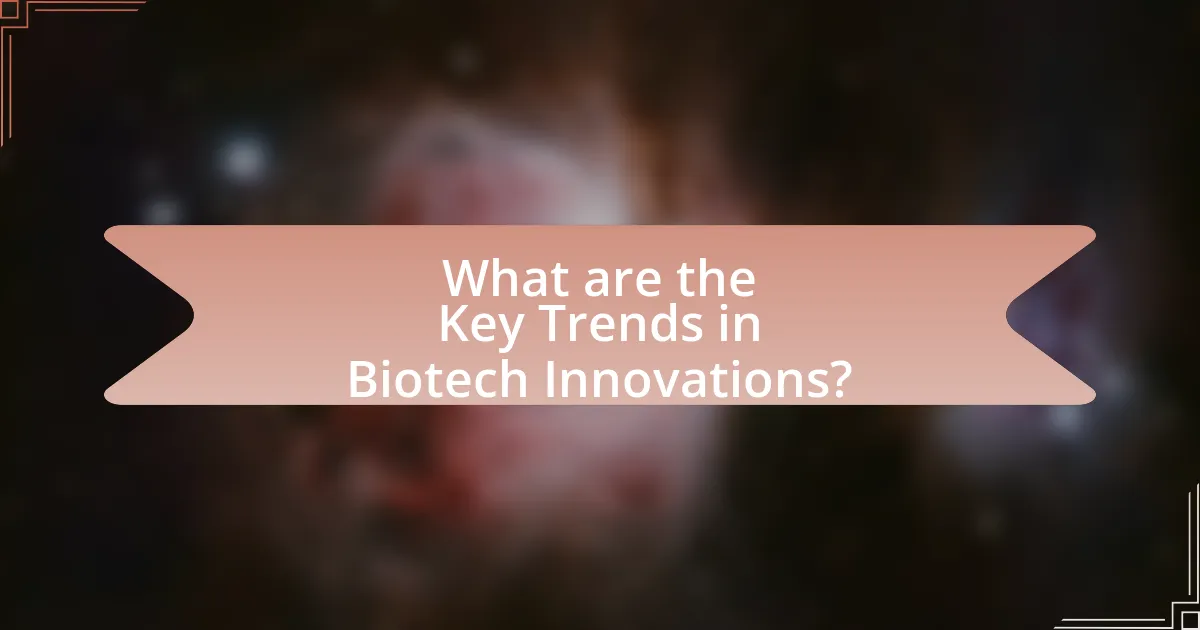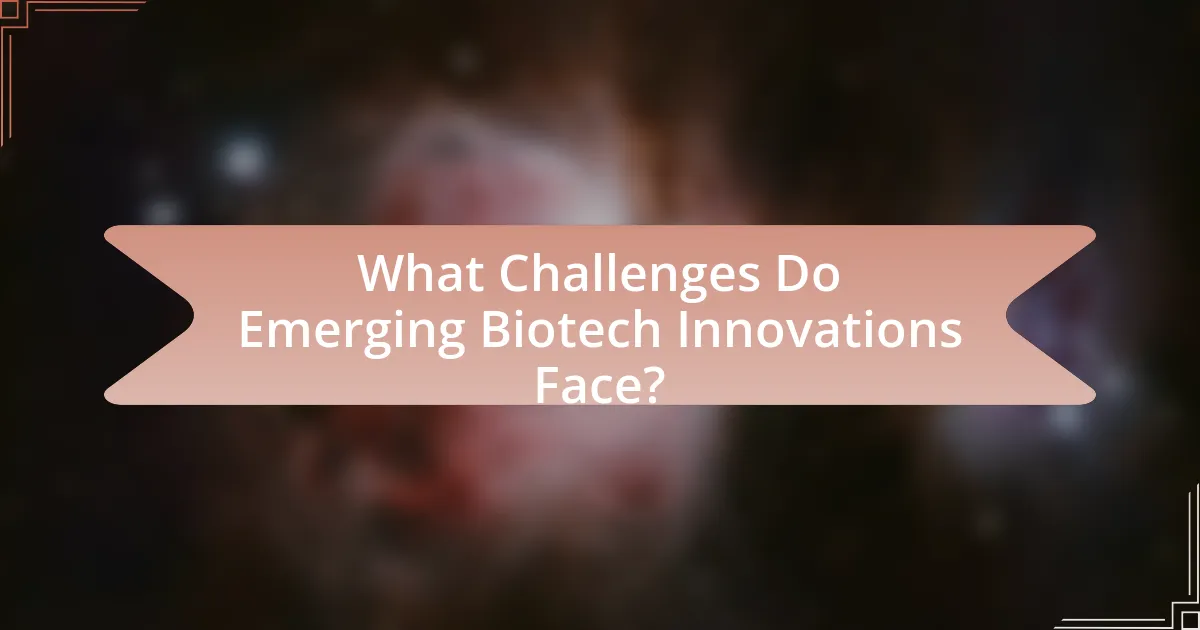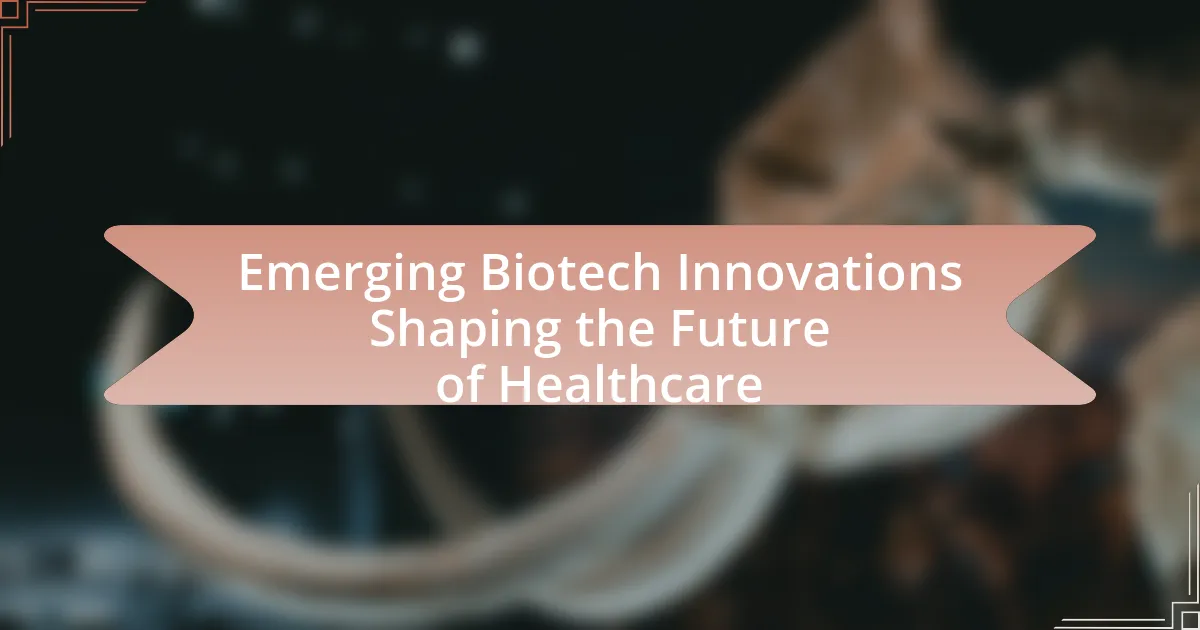Emerging biotech innovations are significantly transforming the healthcare landscape, with key advancements including CRISPR gene editing, personalized medicine, and advanced biomanufacturing techniques. These technologies enhance treatment precision, improve patient outcomes, and streamline drug development processes. The article explores how innovations like genomic sequencing and artificial intelligence are reshaping patient care, the challenges faced by biotech companies, and the ethical considerations surrounding gene editing. Additionally, it highlights the future directions of biotechnology, emphasizing the importance of regulatory compliance and public understanding in fostering advancements in healthcare.

What are Emerging Biotech Innovations in Healthcare?
Emerging biotech innovations in healthcare include CRISPR gene editing, personalized medicine, and advanced biomanufacturing techniques. CRISPR technology allows for precise modifications of DNA, enabling targeted therapies for genetic disorders, as evidenced by its use in clinical trials for conditions like sickle cell disease. Personalized medicine tailors treatments based on individual genetic profiles, improving efficacy and reducing side effects, supported by the increasing use of genomic sequencing in treatment plans. Advanced biomanufacturing techniques, such as 3D bioprinting, facilitate the creation of complex tissues and organs, with companies like Organovo leading the way in developing functional human tissues for drug testing and regenerative medicine. These innovations are transforming healthcare by enhancing treatment precision, improving patient outcomes, and streamlining drug development processes.
How are these innovations transforming patient care?
Innovations in biotechnology are transforming patient care by enhancing diagnostic accuracy, personalizing treatment plans, and improving patient outcomes. For instance, advancements in genomic sequencing allow for tailored therapies that target specific genetic mutations in diseases like cancer, leading to more effective treatments. According to a study published in the journal Nature, precision medicine approaches have shown a 30% increase in treatment efficacy for certain cancer patients. Additionally, the integration of telemedicine and wearable health technologies enables continuous monitoring of patient health, facilitating timely interventions and reducing hospital readmissions. These innovations collectively contribute to a more efficient, effective, and patient-centered healthcare system.
What specific technologies are leading the change?
Gene editing technologies, particularly CRISPR-Cas9, are leading the change in healthcare by enabling precise modifications to DNA, which can potentially cure genetic disorders. Additionally, advancements in mRNA technology, exemplified by COVID-19 vaccines, have revolutionized vaccine development and delivery methods. Furthermore, artificial intelligence is transforming drug discovery processes by analyzing vast datasets to identify potential therapeutic targets more efficiently. These technologies collectively enhance the capabilities of healthcare systems, improve patient outcomes, and accelerate the pace of medical innovation.
How do these technologies improve treatment outcomes?
Emerging biotech innovations improve treatment outcomes by enabling personalized medicine, enhancing drug efficacy, and reducing adverse effects. Technologies such as CRISPR gene editing allow for precise modifications to DNA, leading to targeted therapies that address specific genetic conditions. For instance, a study published in Nature demonstrated that CRISPR can effectively treat genetic disorders like sickle cell disease, resulting in significant clinical improvements. Additionally, advancements in artificial intelligence facilitate the analysis of vast datasets, allowing for the identification of optimal treatment protocols tailored to individual patient profiles, which has been shown to increase recovery rates by up to 30% in certain cancer therapies. These technologies collectively contribute to more effective, safer, and individualized healthcare solutions.
Why is biotechnology crucial for the future of healthcare?
Biotechnology is crucial for the future of healthcare because it enables the development of innovative therapies and diagnostic tools that improve patient outcomes. Advances in biotechnology, such as gene editing technologies like CRISPR, allow for precise modifications of genetic material, potentially curing genetic disorders. Additionally, biopharmaceuticals, which are produced using living organisms, have revolutionized treatment options for diseases like cancer and autoimmune disorders, with the global biopharmaceutical market projected to reach $500 billion by 2025. These innovations not only enhance treatment efficacy but also facilitate personalized medicine, tailoring therapies to individual patient profiles, thereby increasing the likelihood of successful outcomes.
What role does biotechnology play in disease prevention?
Biotechnology plays a crucial role in disease prevention by enabling the development of vaccines, diagnostics, and therapeutics that target specific pathogens and genetic predispositions. For instance, mRNA technology, utilized in COVID-19 vaccines, demonstrates how biotechnology can rapidly produce effective immunizations against emerging infectious diseases. Additionally, biotechnological advancements in genetic screening allow for early detection of hereditary conditions, facilitating preventive measures before the onset of disease. These applications underscore the significant impact of biotechnology in enhancing public health and reducing disease incidence.
How does biotechnology enhance drug development processes?
Biotechnology enhances drug development processes by enabling more precise targeting of diseases through genetic and molecular insights. Techniques such as recombinant DNA technology allow for the production of biologics, which are more effective and safer than traditional small-molecule drugs. For instance, monoclonal antibodies, developed through biotechnological methods, have revolutionized treatments for conditions like cancer and autoimmune diseases, demonstrating higher specificity and reduced side effects. Additionally, biotechnology accelerates the drug discovery process by utilizing high-throughput screening and bioinformatics, which streamline the identification of potential drug candidates. This efficiency is evidenced by the rapid development of mRNA vaccines, such as those for COVID-19, which were created in record time due to biotechnological advancements.

What are the Key Trends in Biotech Innovations?
Key trends in biotech innovations include advancements in gene editing technologies, particularly CRISPR, the rise of personalized medicine, and the integration of artificial intelligence in drug discovery. Gene editing has revolutionized the ability to modify genetic material with precision, leading to potential cures for genetic disorders. Personalized medicine tailors treatments based on individual genetic profiles, improving efficacy and reducing side effects. Additionally, artificial intelligence enhances the drug discovery process by analyzing vast datasets to identify potential drug candidates more efficiently. These trends are supported by significant investments in biotech research, with the global biotech market projected to reach $2.4 trillion by 2028, reflecting the growing importance of these innovations in healthcare.
How is gene editing shaping the future of medicine?
Gene editing is revolutionizing the future of medicine by enabling precise modifications to DNA, which can lead to targeted therapies for genetic disorders, cancer, and infectious diseases. Techniques like CRISPR-Cas9 allow researchers to edit genes with high accuracy, potentially correcting mutations that cause diseases. For instance, clinical trials have demonstrated the effectiveness of gene editing in treating conditions such as sickle cell anemia and beta-thalassemia, with patients showing significant improvement after receiving edited cells. This transformative approach not only enhances the potential for personalized medicine but also paves the way for innovative treatments that were previously deemed impossible, fundamentally altering the landscape of healthcare.
What are the ethical considerations surrounding gene editing?
The ethical considerations surrounding gene editing include concerns about safety, consent, equity, and the potential for unintended consequences. Safety issues arise from the risk of off-target effects, where unintended parts of the genome may be altered, leading to harmful outcomes. Consent is critical, especially when editing the genes of embryos or germline cells, as future generations cannot provide their consent. Equity concerns highlight the risk of exacerbating social inequalities, as access to gene editing technologies may be limited to wealthier individuals or countries. Additionally, the potential for “designer babies” raises moral questions about the extent to which humans should intervene in natural processes. These considerations are supported by discussions in bioethics literature, such as the National Academy of Sciences report on human gene editing, which emphasizes the need for careful deliberation and regulation in this rapidly evolving field.
How does CRISPR technology work in healthcare applications?
CRISPR technology works in healthcare applications by enabling precise editing of genes to treat genetic disorders, enhance disease resistance, and develop targeted therapies. This technology utilizes a guide RNA to direct the Cas9 enzyme to specific DNA sequences, allowing for the addition, removal, or alteration of genetic material. For instance, clinical trials have demonstrated CRISPR’s potential in treating conditions like sickle cell disease and beta-thalassemia, where it successfully corrected mutations in patients’ hematopoietic stem cells. The ability to modify genes with high specificity and efficiency positions CRISPR as a transformative tool in personalized medicine and gene therapy, with ongoing research exploring its applications in cancer treatment and infectious diseases.
What advancements are being made in personalized medicine?
Advancements in personalized medicine include the integration of genomic sequencing, which allows for tailored treatment plans based on an individual’s genetic makeup. For instance, the use of next-generation sequencing (NGS) has significantly reduced the cost and time required for genetic testing, enabling healthcare providers to identify specific mutations in cancer patients and select targeted therapies. According to a study published in the journal Nature, the application of genomic data in clinical settings has led to improved patient outcomes, with targeted therapies showing a 30% increase in efficacy compared to traditional treatments. Additionally, artificial intelligence is being utilized to analyze vast datasets, enhancing the ability to predict patient responses to specific medications, thereby further personalizing treatment approaches.
How does personalized medicine differ from traditional approaches?
Personalized medicine differs from traditional approaches by tailoring medical treatment to the individual characteristics of each patient, rather than using a one-size-fits-all method. Traditional medicine typically relies on standardized treatments based on population averages, while personalized medicine utilizes genetic, environmental, and lifestyle factors to optimize therapy. For example, targeted therapies in cancer treatment are designed based on specific genetic mutations present in a patient’s tumor, leading to more effective outcomes compared to conventional chemotherapy that affects all patients similarly regardless of their unique genetic profiles. This shift towards individualized care has been supported by advancements in genomics and biotechnology, which enable healthcare providers to make more informed decisions based on a patient’s specific biological makeup.
What technologies enable personalized treatment plans?
Technologies that enable personalized treatment plans include genomic sequencing, artificial intelligence, and wearable health devices. Genomic sequencing allows for the analysis of an individual’s DNA, identifying specific genetic markers that can influence treatment efficacy and drug responses. Artificial intelligence processes vast amounts of health data to tailor treatment recommendations based on individual patient profiles, improving outcomes. Wearable health devices continuously monitor vital signs and other health metrics, providing real-time data that can inform personalized care strategies. These technologies collectively enhance the precision of medical interventions, leading to more effective and individualized healthcare solutions.

What Challenges Do Emerging Biotech Innovations Face?
Emerging biotech innovations face significant challenges, including regulatory hurdles, funding limitations, and market access issues. Regulatory hurdles arise from the complex approval processes mandated by agencies like the FDA, which can delay product launches and increase costs. Funding limitations are prevalent as many biotech startups struggle to secure investment, particularly in early stages, with reports indicating that over 70% of biotech companies face difficulties in obtaining sufficient capital. Market access issues stem from the need to demonstrate not only safety and efficacy but also cost-effectiveness to gain acceptance from healthcare providers and payers. These challenges collectively hinder the rapid advancement and adoption of innovative biotechnological solutions in healthcare.
What regulatory hurdles must biotech innovations overcome?
Biotech innovations must overcome several regulatory hurdles, including rigorous safety and efficacy testing, compliance with Good Manufacturing Practices (GMP), and navigating complex approval processes from agencies like the FDA and EMA. These regulatory requirements ensure that new biotech products are safe for human use and effective in treating diseases. For instance, the FDA mandates extensive preclinical and clinical trials to evaluate the safety and efficacy of biotech drugs before they can be marketed, which can take several years and significant financial investment. Additionally, biotech companies must adhere to strict guidelines for manufacturing processes to ensure product quality and consistency, as outlined in the GMP regulations.
How do regulations impact the speed of innovation?
Regulations can significantly slow the speed of innovation by imposing stringent compliance requirements that companies must meet before bringing new products to market. For instance, in the biotech sector, the U.S. Food and Drug Administration (FDA) requires extensive clinical trials and safety evaluations, which can take years to complete. According to a study published in the Journal of Health Economics, the average time for a new drug to receive FDA approval is approximately 10 to 15 years, which can delay the introduction of potentially life-saving therapies. This lengthy process can deter investment and innovation, as companies may prioritize projects with shorter timelines or lower regulatory hurdles.
What are the implications of compliance for biotech companies?
Compliance for biotech companies is crucial as it ensures adherence to regulatory standards, which directly impacts product development, market access, and overall operational integrity. Non-compliance can lead to significant financial penalties, legal repercussions, and reputational damage, hindering innovation and growth. For instance, the FDA’s stringent regulations require biotech firms to conduct rigorous clinical trials and submit comprehensive data for approval, which can delay product launches but ultimately ensures safety and efficacy. Furthermore, compliance fosters trust among stakeholders, including investors and patients, as it demonstrates a commitment to ethical practices and quality assurance in the rapidly evolving healthcare landscape.
How do public perceptions affect biotech advancements?
Public perceptions significantly influence biotech advancements by shaping regulatory policies, funding opportunities, and market acceptance. When the public views biotechnology positively, it often leads to increased investment and support from both private and public sectors, facilitating research and development. For instance, a 2020 survey by the Pew Research Center found that 88% of Americans believe that biotechnology has the potential to improve health outcomes, which correlates with increased funding for biotech initiatives. Conversely, negative perceptions, often driven by concerns over safety and ethical implications, can result in stricter regulations and reduced public support, hindering innovation. For example, public backlash against genetically modified organisms (GMOs) has led to stringent labeling laws in various countries, impacting the pace of biotech advancements in agriculture. Thus, public perceptions play a crucial role in determining the trajectory and success of biotech innovations.
What misconceptions exist about biotechnology in healthcare?
Misconceptions about biotechnology in healthcare include the belief that it solely involves genetic modification and that it is inherently unsafe. Many people think biotechnology only pertains to altering organisms at the genetic level, overlooking its broader applications such as developing vaccines, diagnostics, and biopharmaceuticals. Additionally, concerns about safety often stem from a lack of understanding of regulatory processes; for instance, the FDA rigorously evaluates biotechnological products for safety and efficacy before approval. This regulatory oversight ensures that biotechnological innovations are safe for public use, countering the misconception that they are untested or dangerous.
How can education improve public understanding of biotech?
Education can improve public understanding of biotech by providing clear, accessible information about its principles, applications, and implications. By integrating biotech topics into school curricula and community programs, individuals can gain foundational knowledge that demystifies complex concepts. For instance, studies show that educational initiatives, such as workshops and online courses, significantly enhance comprehension of genetic engineering and its benefits, leading to increased public support for biotech innovations. Furthermore, informed citizens are better equipped to engage in discussions about ethical considerations and regulatory policies, fostering a more informed and proactive society regarding biotechnological advancements.
What are the Future Directions for Biotech Innovations?
Future directions for biotech innovations include advancements in gene editing technologies, such as CRISPR, which enable precise modifications to DNA, potentially curing genetic disorders. Additionally, the integration of artificial intelligence in drug discovery is streamlining the identification of new therapeutic compounds, significantly reducing development timelines. Furthermore, personalized medicine is gaining traction, allowing treatments to be tailored to individual genetic profiles, enhancing efficacy and minimizing side effects. The global biotechnology market is projected to reach $2.44 trillion by 2028, reflecting the increasing investment and interest in these innovations.
How will artificial intelligence integrate with biotechnology?
Artificial intelligence will integrate with biotechnology by enhancing data analysis, improving drug discovery, and personalizing treatment plans. AI algorithms can process vast amounts of biological data, identifying patterns and correlations that humans may overlook, which accelerates the drug development process. For instance, a study published in Nature Biotechnology demonstrated that AI models could predict molecular interactions with over 90% accuracy, significantly reducing the time and cost associated with traditional methods. Additionally, AI-driven tools can analyze patient data to tailor therapies to individual genetic profiles, leading to more effective and targeted treatments.
What potential breakthroughs are on the horizon?
Potential breakthroughs on the horizon in emerging biotech innovations include advancements in gene editing technologies, particularly CRISPR-Cas9, which are expected to enable precise modifications of genetic material to treat genetic disorders. Additionally, the development of personalized medicine through genomic sequencing is anticipated to enhance treatment efficacy by tailoring therapies to individual genetic profiles. Furthermore, innovations in mRNA technology, as demonstrated by COVID-19 vaccines, are likely to expand into other therapeutic areas, including cancer and infectious diseases. These breakthroughs are supported by ongoing research and clinical trials, indicating a significant shift towards more effective and targeted healthcare solutions.
What Best Practices Should Be Followed in Biotech Development?
Best practices in biotech development include rigorous adherence to regulatory compliance, robust quality control measures, and effective project management. Regulatory compliance ensures that all products meet safety and efficacy standards set by authorities such as the FDA, which is critical for market approval. Quality control measures, including thorough testing and validation processes, help maintain product integrity and reliability, as evidenced by the high failure rates of untested biotech products. Effective project management, utilizing methodologies like Agile or Lean, enhances collaboration and efficiency, leading to faster development cycles and reduced costs. These practices collectively contribute to successful biotech innovations that can significantly impact healthcare outcomes.


